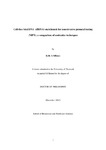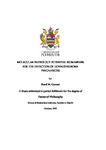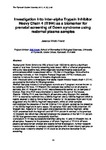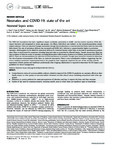Cell-free fetal DNA (cffDNA) enrichment for non-invasive prenatal testing (NIPT): a comparison of molecular techniques
| dc.contributor.supervisor | Avent, Neil | |
| dc.contributor.author | Sillence, Kelly | |
| dc.contributor.other | School of Biomedical Sciences | en_US |
| dc.date.accessioned | 2016-08-17T09:39:18Z | |
| dc.date.available | 2016-08-17T09:39:18Z | |
| dc.date.issued | 2016 | |
| dc.identifier | 10179169 | en_US |
| dc.identifier.uri | http://hdl.handle.net/10026.1/5319 | |
| dc.description.abstract |
Prenatal assessment of fetal health is routinely offered throughout pregnancy to ensure that the most effective management can be provided to maintain fetal and maternal well-being. Currently, invasive testing is used for definitive diagnosis of fetal aneuploidy, which is associated with a 1% risk of iatrogenic fetal loss. Developing non-invasive prenatal testing (NIPT) is a key area of research and methods to increase the level of cell-free fetal DNA (cffDNA) within the maternal circulation have been discussed to improve accuracy of such tests. In this study, three strategies; co-amplification at lower denaturation temperature polymerase chain reaction (COLD-PCR), inverse-PCR and Pippin Prep™ gel electrophoresis, were analysed to identify a novel approach to selectively enrich shorter cffDNA fragments from larger maternal cell-free DNA (cfDNA). The sensitivity of droplet digital PCR (ddPCR) against real-time PCR (qPCR) was compared for fetal sex and RHD genotyping. In addition RHD zygosity testing was carried out for non-maternal samples. Consequently, Pippin Prep™ gel electrophoresis was combined with ddPCR analysis for the NIPD of Down Syndrome (DS) in pseudo-maternal samples. The results revealed that the Pippin Prep™ gel electrophoresis enrichment approach successfully demonstrated 2-fold to 5-fold increases in the cffDNA fraction. However, further optimisation assays of COLD-PCR and inverse-PCR using actual maternal samples were required. The spike experiments for DS detection revealed that with the present assay IV overrepresentation of the chromosome 21 target could be significantly detected for samples with ≥15% ‘cffDNA fraction’. In conjunction with the Pippin Prep™ enrichment method, this would have enabled assessment of all 10 maternal samples. Alternatively, fetal sex and RHD genotyping results determined that ddPCR provides a more sensitive platform compared to qPCR approaches, particularly for samples that express low cffDNA fractions (<2%). The ddPCR platform also proved to be a rapid and accurate system for the determination of RHD zygosity. This study highlights that ddPCR could be used as opposed to qPCR for accurate determination of fetal sex and RHD status. While sequencing approaches currently provide the most sensitive platforms for NIPT of fetal aneuploidy, high costs (>£400) prevent universal application. The combination of cffDNA enrichment with ddPCR analysis could provide a cheaper and more widely available platform for NIPD. However, further large scale validation studies using actual maternal samples are required. | en_US |
| dc.language.iso | en | en_US |
| dc.publisher | Plymouth University | en_US |
| dc.subject | Non-invasive prenatal testing (NIPT) | en_US |
| dc.subject | cell-free fetal DNA (cffDNA) | en_US |
| dc.subject | Fetal sex determination | en_US |
| dc.subject | Fetal genotyping | en_US |
| dc.subject | Fetal aneuploidy | en_US |
| dc.subject | Inverse PCR | en_US |
| dc.subject | Digital PCR | en_US |
| dc.subject | COLD PCR | en_US |
| dc.subject | Pippin Prep gel electrophoresis | en_US |
| dc.subject | Zygosity testing | en_US |
| dc.subject | cffDNA enrichment | en_US |
| dc.subject | Ethylenediaminetetraacetic acid (EDTA) | en_US |
| dc.subject | Streck Cell-Free Blood Collection Tubes (BCT) | en_US |
| dc.subject | Massively parallel sequencing (MPS) | en_US |
| dc.subject | Maternal DNA | en_US |
| dc.subject | Inverse PCR | en_US |
| dc.subject | Real-time PCR | en_US |
| dc.subject | Polymerase chain reaction (PCR) | en_US |
| dc.subject | Depletion | en_US |
| dc.title | Cell-free fetal DNA (cffDNA) enrichment for non-invasive prenatal testing (NIPT): a comparison of molecular techniques | en_US |
| dc.type | Thesis | |
| plymouth.version | Full version | en_US |
| dc.identifier.doi | http://dx.doi.org/10.24382/4051 | |
| dc.identifier.doi | http://dx.doi.org/10.24382/4051 |
Files in this item
This item appears in the following Collection(s)
-
01 Research Theses Main Collection
Research Theses Main





